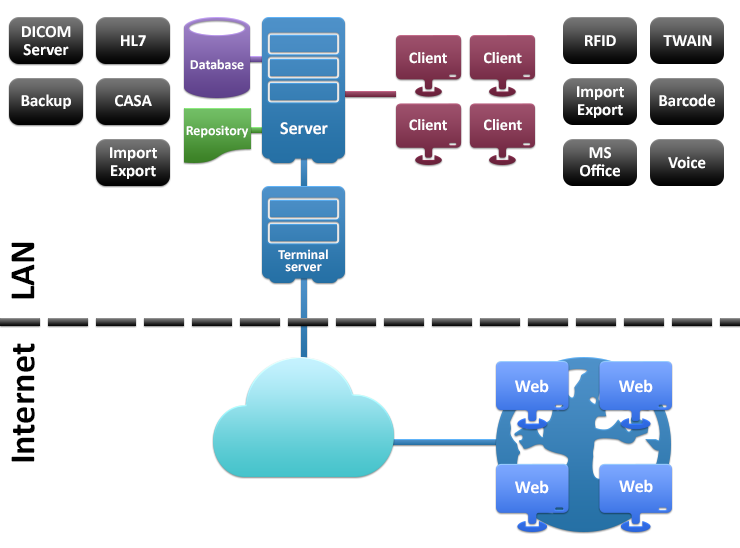MedITEX Software Technical Requirements
From MedITEX - Wiki
MedITEX utilizes a client/server architecture with Firebird 2.5 as its database.
The following diagram shows one example of configuration where MedITEX could be installed.
|
|
Server-client requirements
The table below describes the recommended and minimum requirements for installing MedITEX, as well as additional information regarding some of the applications running on the server and clients to ensure the good quality of services and the proper functioning of MedITEX.
|
It is recommended that the server provided is dedicated exclusively for the use of MedITEX. Having other applications running alongside MedITEX can compromise the overall functionality of the system. |
The optimal solution for maximum performance is a dedicated database server built in an SSD, which is not virtualized.
An SSD (especially enterprise SSD) allows much more IOPS.
Using a Firebird server with the database on an external SAN/NAS is not recommended, since the speed of a Firebird database server depends on the speed of access to individual 4k blocks on the device. External SAN/NAS drives are great for transferring hundreds of MB of data from one file location to another. However the Firebird server transfers hundreds of thousands of small pages between memory and physical hard disk found on different file offsets.
Please consider the access time of a mechanical hard drive to be the limiting factor in performance. A commit writes data in very different file offsets. RAID is not found to improve this limitation as the head position of the hard disk must move in the same way.
 |
Recommended requirements (depending on number of clients):
When the database server and shadow SSDs reach an age of 2 years, they should be replaced to avoid unplanned failure (in server systems, we recommend the same for classic hard drives). Minimum requirements:
|
 |
File based repository: All documents, pictures and common settings are stored on this location. |
 |
Backup Service: Schedules and creates backup of database and repository. |
 |
Recommended requirements:
Minimum hardware requirements:
|
 |
MS Office Integration: All letters based on MS Word templates. Minimum requirement: MS Office 2003 or later. |
 |
TWAIN: TWAIN is used for importing patient photos, ultrasound images (Frame Grabber), etc. |
 |
Voice: Record and play voice messages. |
|
Note that the experience with MedITEX for the client will depend on the speed of the network. All clients must be wired connected to the network and it is recommended the use of 1 Gbps speed. The recommended internet connection should be 16 MB download and 1 MB upload. |
|
It is important to know that a Firebird database server should be a dedicated server and should only be responsible for the Firebird database service in order to ensure maximum performance. Virtual servers lose between 20% and 80 % of their speed under a high load on a VM. Any advantage of a VM-based Firebird Server will be paid for dearly by all employees waiting additional time to carry out and complete their jobs. |
Terminal server requirements
For terminal server architecture a more powerful server is required.
 |
Recommended requirements (depending on number of clients):
|
 |
Minimum requirements:
|
 |
|
Server configuration
|
The server should be configured in the following way:
|
| Back to top |
